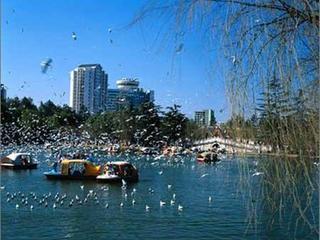|
 Nearer to the delights of South East Asia than to the
heart of China, the city of Kunming gives a special flavour
to a study of Mandarin. A small but enthusiastic foreign
community of students, travellers and international volunteers
will be sure to welcome you to this mysterious city on
a high plateau. With exotic food and many ethnic minority
tribes in the surrounding mountains, Kunming, meaning
Bright Cloud, will give you adventures most other Chinese
cities just cannot provide. Nearer to the delights of South East Asia than to the
heart of China, the city of Kunming gives a special flavour
to a study of Mandarin. A small but enthusiastic foreign
community of students, travellers and international volunteers
will be sure to welcome you to this mysterious city on
a high plateau. With exotic food and many ethnic minority
tribes in the surrounding mountains, Kunming, meaning
Bright Cloud, will give you adventures most other Chinese
cities just cannot provide.
 With mountains surrounding the city on three sides and
a lake to the south, Kunming's vantage point creates
great views over the surrounding region. Higher than
most major cities in China, Kunming can seem very far
away from the rest of the world. However, with new railway
tracks and roads being constructed in recent years, it
is now relatively easy for people in Kunming to reach
Thailand, Vietnam and Laos, as well as the provincial
destinations of Dali to the east and Xishuanbanna in
the south. As mountains make way for jungle passes,
the south of Yunnan is home to many tribes and wildlife
which is a must see for Kunming students. With mountains surrounding the city on three sides and
a lake to the south, Kunming's vantage point creates
great views over the surrounding region. Higher than
most major cities in China, Kunming can seem very far
away from the rest of the world. However, with new railway
tracks and roads being constructed in recent years, it
is now relatively easy for people in Kunming to reach
Thailand, Vietnam and Laos, as well as the provincial
destinations of Dali to the east and Xishuanbanna in
the south. As mountains make way for jungle passes,
the south of Yunnan is home to many tribes and wildlife
which is a must see for Kunming students.
| Kunming's Buzzing Economy |
Once ignored by government reform policies, now Kunming
is joining the economic growth of the rest of the country
by creating tourist havens, improving its transport links
with South East Asia, and trading in its rich mineral
resources. Kunming is experiencing a rapidly increasing
population, currently at about four million, and is one
of the fastest growing cities in China. The new Kunming
International Airport currently under construction will
be the fourth largest in China. The city's salt and
phosphate mines are some of the most bountiful in China.
Historians have discovered evidence of a dwelling on
the edge of Lake Dian that dates back to 279 BC, and
the city was officially founded as Tuodong in 765 AD.
Marco Polo is said to have travelled to the city a hundred
years before the Ming Dynasty took it over and built
a wall around it that still stands to this day. With
its modern cityscapes, natural scenery and an old canal
running through the city center, Kunming has not obliterated
its past, but rather celebrates it. The 20th century
however, saw wartime activity: Kunming was the northern
end of the famous Burma Road which supplied China with
essential goods during World War II.
Kunming's universities graduate students in all fields
from science and technology to agriculture to traditional
Chinese medicine. With long histories of absorbing academics
from top institutions from around the country, Yunnan
University and Kunming University of Science and Technology
are among the best universities in the south eastern
region of China. With expertise in studying the natural
ecology and resources of this diverse area, Kunming is
a base for advanced research. International students
will find their time in Kunming enriched by this environment
of serious learning.
Founded in 1924, Yunnan University has a successful
record of scientific research, particularly in ecology.
Aside from expertise in the classification of Kunming's
exotic plant life, Kunming University is known for having
many students from Yunnan Province's minority communities
as well as courses focusing on the region's diverse cultures.
The university has established exchange relations with
more than 50 institutions of higher learning and research
organizations in more than 20 countries.
| Kunming University of Science & Technology |
As the largest university in Yunnan Province and one
of the well-known universities in China, Kunming University
of Science and Technology (KUST) started admitting undergraduate
students for Bachelor's degrees in March 1925. With
21 faculties covering the fields ranging from science,
engineering and economics to management, arts, law and
education, the university offers a complete list of degree
programs and Chinese language training for international
students.
|